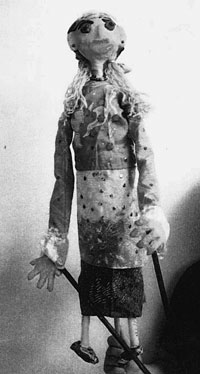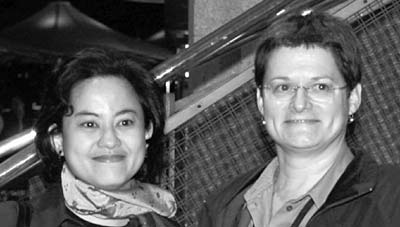Australia-Indonesia Institute Annual Report 2002-2003
The Institute aims to cultivate in Indonesia and Australia an appreciation of the quality, diversity and sophistication of the visual and performing arts in the two countries, and to help develop a market in Indonesia for Australian visual and performing arts and Australian expertise. It also aims to encourage relations between Australian and Indonesian sports people and organisations.
The Institute supported a range of arts activities designed to extend appreciation of each countryÂs artistic traditions and contemporary directions. A particularly successful project included the visit to regional centres by a talented Balinese teacher and artist, which extended the reach of our program beyond the major metropolitan centres. We were also pleased to be able to support the transfer of AustraliaÂs Olympic experience to assist with the long-term development of Indonesian volleyball.
Asialink Arts Residencies in Indonesia
In 2001–2002, the AII continued its long-standing support for the program of residencies in Indonesia organised by Asialink for Australian artists. The popularity of the residency program reflects the attraction IndonesiaÂs traditional and contemporary cultural environment has for Australian artists. This year, the AII was pleased to support residencies in Indonesia for puppeteer Cindy South Czabania, playwright Julie Janson and theatre company manager Mitzi Zaphir. In addition, two Indonesian artists Wildan Antares and Bintang Hanggono were supported for a visit to Australia.
| A puppet produced in one of Ms CzabaniaÂs Yogyakarta workshop sessions. |
Ms Czabania began woodcarving seven years ago in order to expand her existing range of skills that include textile design, figurative sculpture and jewellery. With the AIIÂs support she spent six months in Yogyakarta conducting puppetry workshops for both children and adults. She also conducted mask making workshops, the results of which were exhibited in the International Mask Exhibition at the Palace Exhibition hall, and participated in an event on recycling organised by a local environmental group.
Julie Janson began writing plays with the Australian Aboriginal community while living in Arnhem Land in the Northern Territory. Her work includes the childrenÂs play Kera Putih (White Monkey), set in Bali. Her current project, which she workshopped during her residency in Indonesia is The Crocodile Hotel, set in the Northern Territory in the 1970s and Sulawesi in 1920. During her residency, she maintained a busy schedule visiting theatres and arts organisations across Java, Sumatra and Bali. She was also hosted by Petra University in Surabaya where she was warmly welcomed by staff and students and gave a number of lectures and workshops.
Mitzi Zaphir has worked extensively in theatre company management. During her residency, Mitzi was based at the Kelola Foundation in Solo, Central Java, where she assisted with a number of projects including workshops and briefings for Indonesian arts managers seconded to Australia, the workshop program for local artists and arts managers, grant-making workshops and a research project into the management of traditional arts in Indonesia.
Wildan Antares and Bintang Hanggono, from Yogyakarta, Indonesia, are artists working in the areas of installation, performance, multimedia and animation. They have collaborated in multimedia and video projects and, with other artists, published Core Comic and worked with Geber: Modus Operandi and Musik Elektronik Mencari Harmoni. Under the residency program, they collaborated as artists-in-residence with the Melbourne Fringe Festival, and also worked with Greg Dyson from Victorian University of Technology on the performance Amphybious at the Victorian College of the Arts.
49th Sydney Film Festival
The Institute promoted the quality of Indonesian film making to an Australian audience and assisted the further development of linkages between the Indonesian and Australian film industries by funding the visit to Australia of Shanty Harmayn, a prominent film producer, for the 49th Sydney Film Festival.
| Shanty Harmayn (left) and Gayle Lake, director of the Sydney Film Festival (right) after the screening of ÂWhispering Sands at the 2002 Sydney Film Festival. |
Ms HarmaynÂs film ÂWhispering Sands (ÂPasir BerbisikÂ) was screened twice during the festival to appreciative audiences. Her introductions and answering of questions after the film added greatly to audience appreciation of the film. The film was rated one of the top five features (non-fiction) screened at the Dendy Opera Quays theatre during the festival. Ms Harmayn provided media interviews throughout the festival and acted as a judge for the FestivalÂs Rouben Mamoulian Award. She was also able to address film students at educational institutions and was the guest of honour at a reception by the Women in Film and Television Industry (WIFT).
It is hoped that the visit by Shanty Harmayn will lead to greater collaboration between the Australian and Indonesian film industries, including the possibility of a further Indonesian program at the 2003 Sydney Film Festival.
Indonesia Goes Bush
In assisting Charles Sturt University to bring Muhammad Bundhowi, a talented speaker, teacher and artist from Bali, the AII supported a practical step in delivering opportunities for residents in regional and rural communities in NSW to explore, study and observe aspects of Indonesian culture, language and creative art.
Through January and February 2002, Pak Bundhowi gave lectures and participated in art and language workshops and seminars throughout southern NSW, from Sydney and Bathurst to Griffith, Wodonga and Wagga Wagga.
Persatuan Bola Voli Seluruh Indonesia – Gold Medal Plan for Volleyball
The AII is helping to transfer Australian sports knowledge and experience to assist with the development of a long term technical plan for Indonesian volleyball by providing support to the Indonesian National Volleyball Association. This project draws on the 2000 Olympic Plan developed by the Australian Volleyball Federation and includes the employment of an Australian as National Technical Director, the establishment of a Master Coach Program, a talent identification program, and a series of intensive exchanges of coaches and players with Australian sports institutions and the high profile TV leagues in Indonesia.
Volleyball is the second largest participation sport in Indonesia and the aim of the project is to make Indonesian teams more competitive and provide a role model for other Indonesian sports to follow. It brings together the expertise of the Australian Institute of Sport, the Australian Volleyball Federation, the Queensland Academy of Sport and the Queensland Volleyball Association to develop and implement a four-year strategic plan to significantly raise performance standards at the highest levels in Indonesia.
This project sees the practical implementation at a sport specific level of many of the recommendations made in the Plan for Indonesian Sport prepared by Dr Allan Coles for the Indonesian Ministry of Youth Affairs and Sport, a study which was commissioned by the AII in 1996.
Kerja Sama Indonesia dan Australia
Since 1951, Australian Volunteers International has developed an impressive program to provide volunteers to assist development in Indonesia. Kerja Sama comprised an exhibition of over 40 photographs showing Indonesians and volunteer Australians working together through the past five decades, spotlighting a relatively little known element in the Australia–Indonesia relationship which has proved its value in engendering long lasting relationships.
With support from the AII, Kerja Sama was displayed in the specialist gallery of the Antara national news agency, attracting a large audience to its twelve day display in Jakarta, before moving to Makassar in south Sulawesi for an additional successful exhibition.
Australia–Indonesia Poetry Exchange 2002
The Institute provided substantial assistance to the Australia Indonesia Arts Alliance (AIAA) and Reformasi Newspaper to bring to Australia two of IndonesiaÂs leading modern poets for a series of poetry readings, discussions and university visits in May 2002. The project aimed to create opportunities for collaboration between Indonesian and Australian poets as well as to create appreciation of Indonesian poetry in Australia.
Emha Ainun Nadjib, who is considered to be IndonesiaÂs foremost modern poet, and Fathyen Hamama Handry, one of IndonesiaÂs leading female poets toured Sydney, Canberra and Melbourne presenting readings of their work at significant events such as the Sydney Writers Festival, Victorian Writers Centre, the ANU, University of Melbourne and at events at the Indonesian Embassy in Canberra and Indonesian Consulate in Melbourne.
The project was successful in creating opportunities for collaboration with Australian artists and had extraordinary success in reaching a wide cross section of the community from school and university students to the Australian literary audience.


